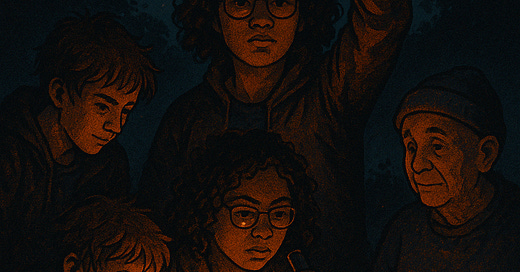What happens to reason under a regime that outlaws doubt?
What happens to knowledge when inquiry itself becomes a threat?
The Trump regime is actively undermining science. We are witnessing a coordinated attack on public understanding, academic freedom, and the capacity to question power. These aren’t bureaucratic shifts or budgetary adjustments. They are deliberate attempts to unmake the conditions in which informed collective agency can exist.
This goes beyond defunding universities or dismantling institutions. It’s a cultural offensive designed to erode the very idea that research should inform decision-making, or that knowledge should emerge from shared experience, not imposed ideology. And the consequences are profound—not just for scientists or scholars, but for anyone who depends on reliable methods of understanding the world.
Our response cannot be defensive. It must be visionary. We need to imagine—and build—a research culture that not only survives authoritarianism, but actively resists and transcends it.
The War on Knowledge
Authoritarianism doesn’t just spread lies—it attempts to erase the capacity to distinguish, to discern, to interpret. It attacks not only what is known, but how knowing happens.
In the United States, the regime’s assault on public health has left institutions weakened and workers demoralized. The pandemic revealed this collapse in real time, as science-based recommendations were cast as partisan threats, and expertise was recast as arrogance. But rather than rebuilding capacity, the regime continues to politicize and punish those who speak from evidence.
Diversity, equity, and inclusion programs have been defunded, banned, or demonized in dozens of jurisdictions. These efforts target the research and knowledge rooted in lived experience—especially that of racialized, disabled, queer, and neurodivergent communities. It’s not just about who gets hired; it’s about what questions are considered valid, and which stories are allowed to shape collective understanding.
The attack on academia is similarly structural. From gag orders on professors to politically appointed boards controlling curriculum, universities are being turned into ideological battlegrounds. The goal is not to improve higher education, but to neutralize it as a site of independent thought.
Perhaps most chilling is the scapegoating of neurodivergent people, especially those with autism. What should be a call for care and inclusion has instead become a flashpoint of cruelty—an attempt to dehumanize, other, and exclude. This isn’t just a moral failure. It’s an epistemic one. When society targets those whose cognition is different, it is choosing to limit the range of perspectives available for understanding the world.
The People's Science
What if research didn’t belong to institutions at all?
What if it was a shared civic practice—embedded in communities, accountable to the public, and impossible to censor or defund?
This is not a hypothetical vision. Across the world, a new research culture is already taking shape. It includes citizen scientists tracking environmental change without government approval. It includes open-source biomedical networks advancing treatments neglected by the pharmaceutical industry. It includes cooperative data infrastructures that treat information as a collective good, not private capital.
And it includes neurodivergent, disabled, and marginalized people conducting inquiry on their own terms—redefining not just what we study, but how and why we study it.
What unites these efforts is not just their accessibility or innovation. It is their refusal to separate method from politics. They recognize that how we know shapes how we live. And that resisting authoritarianism means remaking the systems through which knowledge is created, validated, and shared.
Inquiry Without Permission
In times like these, neutrality is not an option. Research has always been political—what changes is whether it aligns with power or challenges it.
Authoritarian regimes fear research not because of what it finds, but because of how it works. The insistence on evidence, the embrace of uncertainty, the willingness to be wrong—these are deeply threatening to ideologies built on obedience and control.
That’s why resistance means more than preserving academic titles or tenure tracks. It means building practices that are participatory, public, and rooted in mutual care.
Imagine research collectives hosted in libraries, schools, and farms. Imagine protocols and methods open to inspection and improvement. Imagine publishing as public education, not career advancement. Imagine inquiry that begins with questions communities actually care about—and produces knowledge they can use.
Science becomes resistance when it is accountable to the people, not the state. When it challenges domination instead of legitimizing it. When it expands what is possible to imagine, not what is profitable to measure.
Building an Infrastructure That Cannot Be Colonized
We don’t need new institutions. We need new infrastructures—social, technical, epistemic.
We can begin by connecting across borders. Researchers, artists, hackers, farmers, care workers—anyone who asks questions and shares findings—can form resilient alliances. Together we can build distributed archives, federated publishing platforms, and shared repositories for data, methods, and experiments.
We can use encryption, peer-to-peer tools, and mutual aid to safeguard inquiry in hostile environments. We can train each other. Fund each other. Cite each other.
And we must reject colonial hierarchies of knowledge. Indigenous science, feminist critique, Black studies, queer epistemologies—these are not peripheral. They are essential. Because they have long resisted systems of extraction, erasure, and control. They have modeled what it means to do research without domination.
The future of inquiry is not centered in labs or universities. It is distributed across networks, across experiences, across generations.
Knowledge as a Commons, Not a Commodity
We are not just fighting for knowledge.
We are fighting for the capacity to learn, to share, and to act.
In a moment where authoritarianism seeks to monopolize meaning and suppress dissent, research must become a revolutionary act. A practice of collective sense-making. A tool for liberation. A refusal to be silenced.
This is the future of research. Not as a profession. Not as a status symbol.
But as a shared project of survival, imagination, and transformation.




